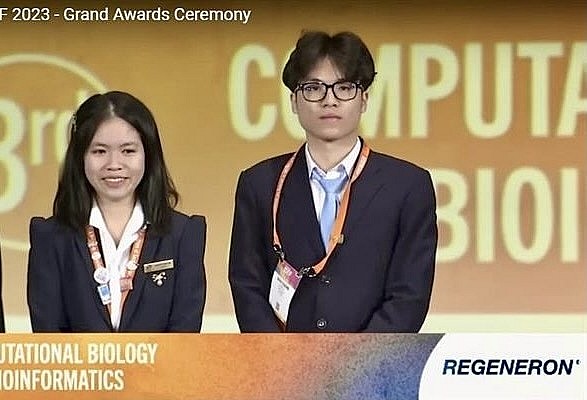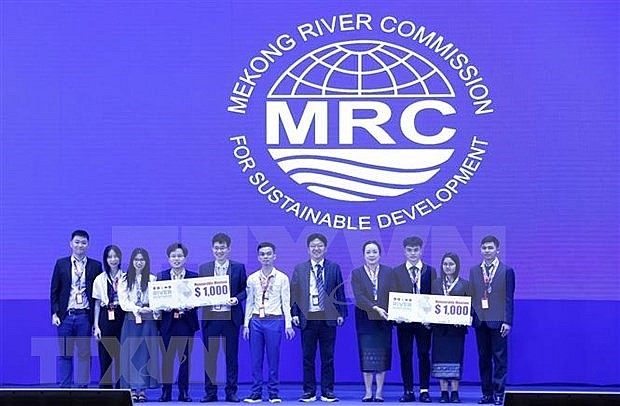 |
| Nguyen Thi Mai Anh (L) and Nguyen Binh Giang from the High School for Gifted Students of the University of Science under the Vietnam National University, Hanoi (VNU) win the third prize at Regeneron ISEF 2023) Grand Awards. Photo: moet.gov.vn |
The winning project on pharmacological effects on the central nervous system of Litsea cubeba fruit and leaf essential oils based on pharmacological network in the Computational Biology and Bioinformatics (CBIO) category was developed by Nguyen Thi Mai Anh and Nguyen Binh Giang from the High School for Gifted Students of the University of Science under the Vietnam National University, Hanoi (VNU), VietnamPlus reported.
Another project, a quadruped robot model used to assist search and rescue operations in landslide-affected areas, earned a Special Award presented by the US Agency for International Development. The project was created by Le Minh Duc and Le Nguyen Trung Kien from Le Hong Phong High School for Gifted Students in Ho Chi Minh City.
The organizing board of REGENERON ISEF 2023 highly valued Vietnam’s extensive promotion of scientific research and the organization of an annual science and engineering competition for high school students, describing it as an integral part of gradually enhancing the quality of scientific research and projects for national and international competitions. They noted that these efforts are invaluable in helping to drive innovation and progress.
Initiated in 1952, the International Science and Engineering Fair (ISEF) is the world’s largest global science competition for high school students. Every year, around 1,800 high schoolers from 80 countries and territories around the world come together to present their research results in 22 fields of the competition.
This year’s competition was held in Dallas, USA, from May 14th to 19th, attracting the participation of 1,600 students from 61 countries and territories, with 1,302 projects on show. Vietnam had seven projects featured in the competition.
In March, students’ teams from the Water Resources University and Can Tho University in Vietnam won two second prizes for technologies to monitor water level and measure soil moisture in a contest initiated by the Mekong River Commission (MRC). The competition, which was held in Vientiane, Laos, was reported by Nhan dan (People) newspaper.
The organizer presented four first prizes and four second prizes to the winners.
 |
| Students receive the prizes at the award ceremony. Photo VNA |
The competition saw the participation of 14 teams from 11 universities in MRC member states of Cambodia, Laos, Thailand, and Vietnam.
The Mekong River Basin Technology Contest aimed to seek sustainable and advanced technologies for monitoring water levels, rainfall, soil moisture, and water quality in the Mekong River. The contest also contributed to strengthening the professional capacity of young people, while promoting the belief that the people of the Mekong River Basin can solve relevant problems through innovative and creative technology.
Products from the 11 participating universities are showcased at the Lao National Convention Centre, where the 4th Mekong River Commission (MRC) Summit is being held from April 2nd to April 5th. Attendees of the summit have the chance to explore the innovative products designed by the universities and see firsthand the incredible talent and research that is coming out of the region.
The Mekong River Commission (MRC) is an intergovernmental organization established in 1995 following the Mekong Agreement between Cambodia, Laos, Thailand, and Vietnam. As a regional platform, it encourages cooperation and knowledge sharing related to the Mekong River Basin, which covers parts of all four countries. The MRC works to promote sustainable development and management of the Mekong Basin’s natural resources, while also addressing climate change and environmental protection in the area. It provides a forum for dialogue and coordination among the four countries, allowing them to collectively manage the shared water resource.
The MRC is currently operating approximately 250 monitoring stations to track essential factors influencing Southeast Asia’s largest river, including hydrology, rainfall, water quality, ecological health, fisheries, and drought. Unfortunately, the majority of the monitoring technologies utilized by the MRC depend on imported hardware, which can be costly and sometimes outdated.






